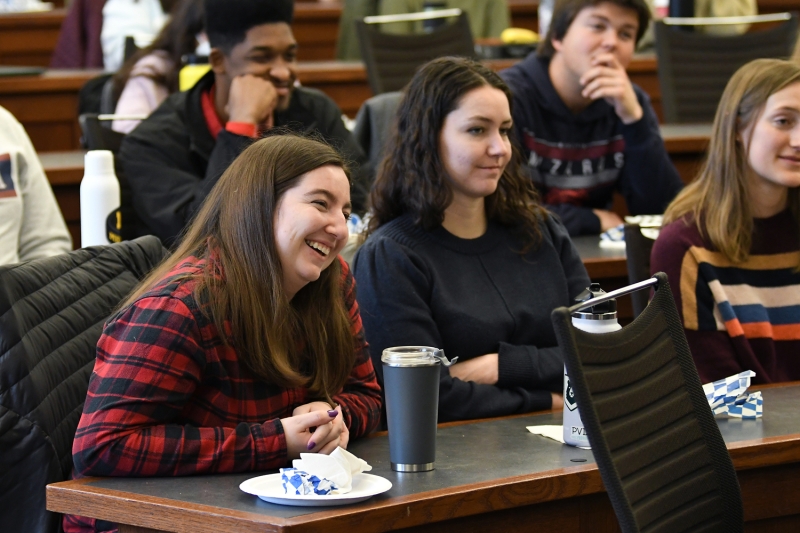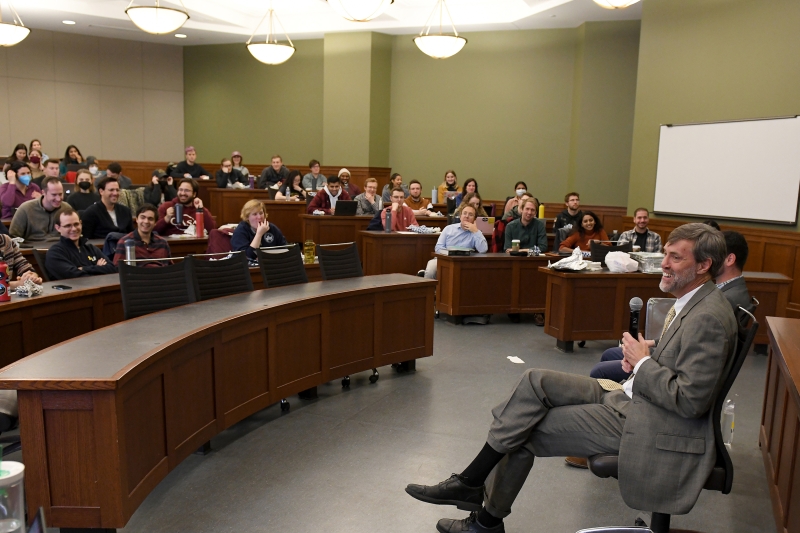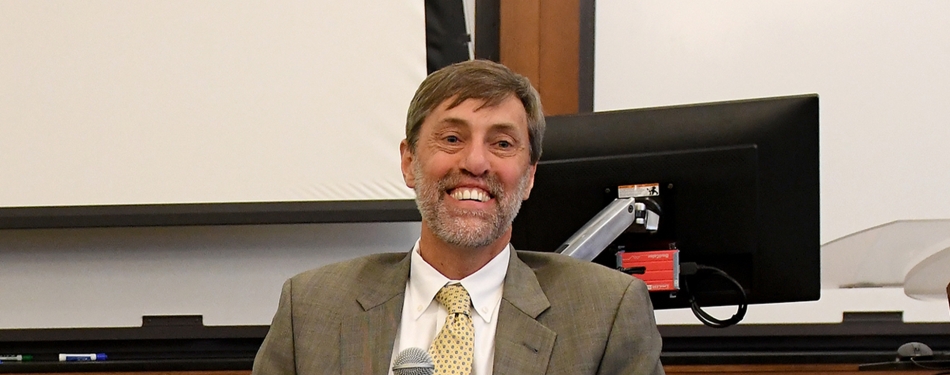In a classic case of life imitating art, The Onion—a satirical publication that calls itself America’s Finest News Source—has filed an amicus brief with the US Supreme Court defending an Ohio man’s right to parody his local police department.

Balancing humor with serious argument about First Amendment rights, the brief reads like one of the digital publication’s own stories, such as 1997’s “Supreme Court Rules Supreme Court Rules” about an 8-1 decision stating that the Court does, indeed, rule.
That story, particularly relevant in this case, is just one of many from The Onion cited in the 16-page brief, whose authors include Andrew Portinga, ’96. A member of the Grand Rapids, Michigan, firm Miller Johnson, he shared insights into the development of the brief during a November 17, 2022, talk at the Law School.
Is satire protected speech?
At issue was whether a satirical Facebook page that Anthony Novak posted about the Parma, Ohio, police department was protected speech. When people called police to ask whether the page was real, the police seized Novak’s computer equipment, arrested him, and charged him with using a computer to interfere with police business.
A jury acquitted Novak, who then filed a civil rights lawsuit. After discovery, the district court granted summary judgment to the defendants, and the US Court of Appeals for the Sixth Circuit affirmed, ruling that the police were entitled to qualified immunity. In September, Novak filed a petition for certiorari with the US Supreme Court.
Soon, the staff at The Onion decided to file the amicus brief—in its inimitable style.
“Indeed, ‘Ohio Police Officers Arrest, Prosecute Man Who Made Fun of Them on Facebook’ might sound like a headline ripped from the front pages of The Onion,” the brief reads. “So, when The Onion learned about the Sixth Circuit’s ruling in this case, it became justifiably concerned.”

Portinga, who practices commercial litigation, became involved when his former coworker and Novak’s attorney, Patrick Jaicomo, asked him and Steve van Stempvoort, also at Miller Johnson, to lend The Onion a hand with the brief. The starting point was a document written by The Onion’s head writer.
“Mike Gillis gave us about five pages of good content, and that good content became the heart of the brief,” Portinga told the audience. “And then there was a lot of back and forth with the client—much more so than in many other briefs—to mold it into an argument that made some sense, that actually had a point.”
Sanding down the “edge”
The result is one of the rare briefs that provides for entertaining reading, starting with the over-the-top, rather dubious first paragraph: “The Onion is the world’s leading news publication, offering highly acclaimed, universally revered coverage of breaking national, international, and local news events. Rising from its humble beginnings as a print newspaper in 1756, The Onion now enjoys a daily readership of 4.3 trillion and has grown into the single most powerful and influential organization in human history.”
The brief goes on to deconstruct the meaning of parody:
“I. Parody Functions By Tricking People Into Thinking That It Is Real.
II. Because Parody Mimics ‘The Real Thing,’ It Has The Unique Capacity To Critique The Real Thing.
III. A Reasonable Reader Does Not Need A Disclaimer To Know That Parody Is Parody.
IV. It Should Be Obvious That Parodists Cannot Be Prosecuted For Telling A Joke With A Straight Face.”
Gillis’s initial draft was “edgier” than the final petition, said Portinga, who said they had to “sand down” some of the content. He noted that none of the jokes in the final brief mentioned any individual Supreme Court justice by name.
“But that wasn’t the case in the first draft,” he added.
A big reaction
Because that first draft formed so much of the basis of the brief, Portinga said that he wished Gillis’s name could appear on the brief, but because he is not a lawyer, he can’t have that recognition. The same goes for another lawyer whose firm did not want its name attached to the brief, a point not lost on Portinga and van Stempvoort. “When Steve and I heard that, we looked at each other and said, ‘Are we supposed to get permission to do this?’”
Portinga added that the reaction to the brief has been bigger than he anticipated.
“I assumed that the law nerd sites would pick it up,” he told the students. “I didn’t expect to get a call from The New York Times. I got emails, literally, from people around the world, including an email from a member of Parliament in Canada. It’s weird.”
He hopes that kind of attention can distinguish the brief from the thousands of petitions for certiorari that the Supreme Court receives. Currently, he is not sure whether the Court will take the case, “but I think the odds went up because of the attention it got.”







